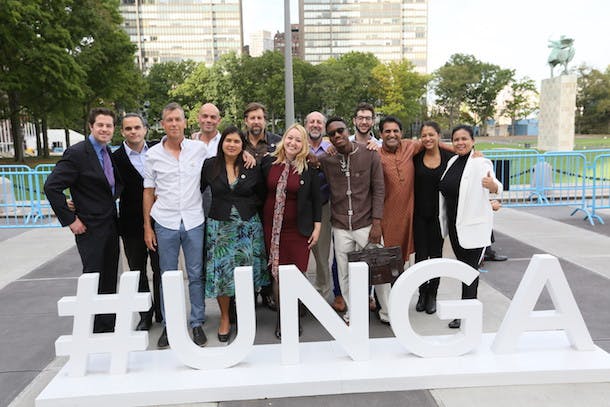
This September’s opening of the 71st session of United Nations General Assembly was a powerful reminder that we live in critical times. A year after the adoption of the Sustainable Development Goals, the UN is on the cusp of electing a new Secretary-General, the United States is nearing the final inning of a presidential election, and issues ranging from refugees and migration to the threat of antimicrobial resistance make clear that our futures depend on the vitality and seriousness of our cooperation – across countries, communities, and sectors.
The world’s most pressing issues were high on the UN agenda last week, including the collective stain of Syria that continues to shame us all. But equally high on the agenda were some of the world’s most breathtaking opportunities to advance human well-being through international cooperation and embrace of our common humanity.
At the Social Good Summit, U.S. Vice President Joe Biden called for a Cancer Moonshot and launched a major new international research push to combat that cruel disease.
At the UN, the President of Colombia presented a copy of the peace agreement that marked the hard-won end of the 52-year long civil war in his country, an agreement that the UN will help carry forward.
And the world quickened its march to stem climate change and implement the Paris climate deal as the first threshold of that agreement was crossed with 60 countries formally joining.
Throughout last week, we were also reminded that in the past 20 years, wars and their casualties have dropped precipitously, hundreds of millions have been lifted out of extreme poverty, and the death toll of killers like HIV/AIDS, polio, measles, and malaria have been significantly dented. That progress – spurred in no small part by the UN – should galvanize us to move with urgency on the Sustainable Development Goals that will build on these gains to tackle vital outstanding tasks.
Leaders who gathered in New York raised the visibility of crucial issues that can drive that progress for us all. The UN Secretary-General’s High-level Panel on Women’s Economic Empowerment drove home the transformative power of women’s equality. Leaders from every region insisted on the imperative of LGBTI rights.
Data also had its day – indeed several – last week, with dynamic initiatives like Data2X and the Global Partnership for Sustainable Development Data demonstrating the power and urgency of using data to drive solutions and inform decision-making in areas ranging from health to gender equality to employment.
Human ingenuity – an essential accelerator of progress – was also on display. Just look at the 10 “solution-makers” at the Solutions Summit whose creativity, drive, and passion for human betterment are bringing us scalable solutions like the Syria Humanitarian Tracker, doctHERs, and EcoLoo to address real needs of real people in real places. Or the companies and philanthropies that have embraced the Sustainable Development Goals and the Paris Agreement as an historic opportunity to align markets, transform business models, and mobilize the investments needed to promote long-term prosperity and well-being.
And in smaller conversations throughout the week, UN, government, business, civil society innovators, artists, and citizens rolled up their sleeves to figure out how to pool talents and resources to tackle our most urgent shared tasks.
At a time when our politics often focus on what divides us, empathy made a reassuring appearance. Not a small number of leaders used their time at the UN to insist on a world governed by mutual respect, compassion, and law, where countries and neighbors welcome those in need and resist exploiting fear for political gain. A colleague of mine wrote of nine remarkable individuals who inspired him last week. President Obama, at the Leaders’ Summit on Refugees, introduced us to Alex, the 6-year-old who wrote to him offering to take in Omran, a 5-year-old boy from Aleppo: “Dear President Obama, remember the boy who was picked up by the ambulance in Syria? Can you please go get him and bring him to our home? … We will give him a family, and he will be our brother.” What drives us at the best of times to offer love, compassion, and support is at the moral heart of the UN: “We the peoples of the United Nations.”
Every UN General Assembly has an arc and a mood. This year’s reflected the complex blend of challenge and opportunity, anxiety and aspiration, that has come to define these early years of the 21st century. This is of course also a year of transitions, as a new UN Secretary-General and a new United States president assume office together for the first time since Dwight Eisenhower and Dag Hammarskjold, and as the world moves into a new era of implementing the landmark agreements reached last year in the Addis Ababa Action Agenda, the Sustainable Development Goals, and the Paris climate agreement.
In their final remarks to the UN General Assembly in their current roles, both UN Secretary-General Ban Ki-moon and U.S. President Barack Obama urged that we neglect cooperation at our peril, from tackling conflict and violent extremism to addressing the needs of the most vulnerable. They reminded us that the health of our world, in ways large and small, depends on the choices we make and the stands we take. UN Deputy Secretary-General Jan Eliasson often says that our shared task is to close the gap between the world as it is and the world it should be. Alex from Scarsdale had it right: “He will be our brother.” Let us all find ways in the years ahead to make it so.



 View All Blog Posts
View All Blog Posts